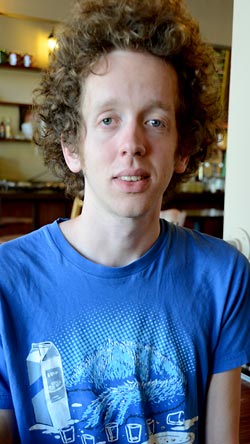Pedagogy of the obsessed: ‘Wikignome’ spreads the word
As part of a student-run course on online piracy, Kevin Gorman discovered Wikipedia's potential as a tool for teaching and learning. Since then the UC Berkeley undergrad has become an evangelist for collaborative online encyclopedia-making, coaching campus instructors and students on using Wikipedia-based assignments to enhance learning and disseminate information online.

October 16, 2012
 BERKELEY — While studying geology, undergrad Kevin Gorman heard about a horizontal tunnel near the Hearst Memorial Mining Building, dug to serve as a hands-on training ground for early campus mining and metallurgy students.
BERKELEY — While studying geology, undergrad Kevin Gorman heard about a horizontal tunnel near the Hearst Memorial Mining Building, dug to serve as a hands-on training ground for early campus mining and metallurgy students.
Curious to learn more, he went hunting on the web — only to discover there was “no comprehensive mention” online of the obscure mining tunnel near the Hayward Fault. “Now there is,” he says.
That’s because Gorman — an evangelist for collaborative online encyclopedia-making — took matters in his own hands, creating a “useful compendium” on the Lawson Adit for all to read on Wikipedia, which calls itself “the free encyclopedia that anyone can edit.”

Kevin Gorman (Cathy Cockrell/NewsCenter photo)
A slender, 6-foot-5 redhead who describes himself as “vaguely nerdy,” Gorman got involved with Wikipedia, and the related Wikimedia Foundation, as part of a classroom assignment: In the DeCal course “The Politics of Piracy,” students were required to make substantial edits on course-relevant Wikipedia articles.
“I took to it fairly well,” he says.
Call that an understatement. After fulfilling the editing assignment (he focused on Perfect 10, Inc. v. Google, Inc., a court case involving the fair-use doctrine), Gorman became an active Wikipedia editor, revising and creating (under his own name) entries on eclectic subjects that catch his interest, from mushrooms to cyberlaw to men’s rights.
(The latter proved surprisingly controversial. “Let’s show hippy boy what the real world is like,” one men’s-rights blogger inveighed, after Gorman edited a Wikipedia entry that failed to “follow our encyclopedic policies,” as he tactfully puts it. “Perhaps we should tell everyone at UC Berkeley what a rotten person Kevin Gorman is,” the writer went on. “Let’s hound him until he has no space to escape.” A commenter on a feminist site had a different take on Gorman: “From reading what you’ve said so far, I’m not sure he’s even a feminist. He’s just really obsessed with encyclopedias.”)
Wikignome at work
She had a point, as Gorman had also taken to monitoring new Wikipedia entries for quality, and to acting as what is known, in his chosen subculture, as a “wikignome” — someone who makes incremental edits without clamoring for credit.
He landed an internship at the San Francisco-based nonprofit Wikimedia and volunteers as a campus ambassador for the foundation’s education program. In that role, Gorman encourages instructors to create Wikipedia-based class assignments, and visits classes to offer technical assistance and “mitigate tensions” between Wikipedian and academic mores.
“Students are used to looking at sources, synthesizing and trying to form something new,” he explains. On Wikipedia, original research is verboten; the goal instead is to create a summation, replete with hyperlinked citations, of what’s already been written on a given subject.
Despite that tension, Gorman is sanguine about Wikipedia’s value as a pedagogical tool (given skillful instructional design) and a potential force for good in the world. Granted, about a fifth of its current 22 million articles are in English, and the lion’s share of its 77,000-plus volunteer editors are white males in the global North — introducing “interesting systemic biases” into its content, says Gorman.
Yet the site, founded 11 years ago, boasts 470 million unique visitors monthly, and official Wikipedias in nearly 300 languages.
In parts of the world where information is hard to come by, and at particular moments of crisis, a Wikipedia entry can become a vital “first point of information,” Gorman argues. A student-generated article on nuclear-energy policy, for instance, got “literally hundreds of thousands of views,” he reports, when a tsunami overwhelmed the Fukushima Daiichi power plant in March 2011. Wikipedia “is a really neat resource, and one that’s worth trying to get right,” he says.
Homing in
A tuition waiver related to his father’s military service has made it financially feasible for Gorman to take the slow road to his bachelor’s degree. He’s now in year six, hoping to graduate in 2013 – if interesting wiki opportunities don’t get in the way.
After focusing first on geology, then Scandinavian studies, he’s finishing up in geography — a fitting major, perhaps, for a so-called Navy brat who’s spent his life in Florida, Hawaii, Japan, Massachusetts, Pennsylvania, Virginia, Morro Bay, San Diego and now Berkeley.
“I don’t have any location I associate with home; home is where I’m sleeping,” Gorman insists. “By the time I graduate from Berkeley, it will have been the longest I’ve ever lived in the same place.”
For now, Gorman is hanging tight in his newfound “home” in the space where web technology meets collaborative content creation — hanging tight and hoping that “something related to open tech will end up being my career path.”
The signs are promising. This semester, besides taking classes and coaching a sociolinguistics class in the whys and ways of Wikipedia, he’s starting a part-time job that draws on his growing expertise.
He’d prefer not to be called an expert, however. “This is what has come out of trying to do neat things so far,” Gorman says firmly. “I try to do neat things.”
To meet other persons of interest, click above.
Know a member of the campus community — staff, student or faculty — who might make a good subject for “Persons of Interest”? Send us a note at [email protected].